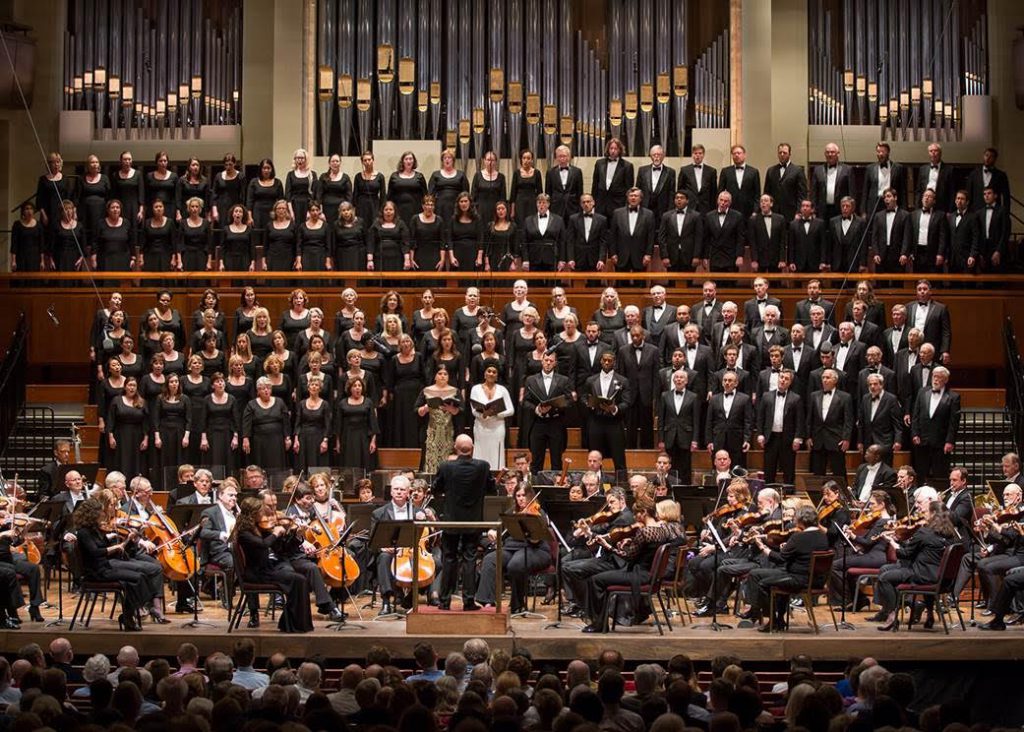Eschenbach at his vivid, captivating best in NSO farewell

Christoph Eschenbach conducted the National Symphony Orchestra in music of Beethoven and Bright Sheng Thursday night at the Kennedy Center. Photo: Scott Suchman
This week Christoph Eschenbach concludes his seventh and final season as music director of the National Symphony Orchestra. When he took over the ensemble, in the fall of 2010, the NSO seemed rudderless. Leonard Slatkin had ended an uneven tenure, and the orchestra was struggling along with a revolving roster of temporary conductors. Over the years Eschenbach has raised the orchestra’s profile outside Washington, through several international tours, and improved the ensemble’s sound.
Eschenbach’s best work with the orchestra has been in music from the 20th and 21st centuries. His most memorable performances with the NSO have been big ambitious pieces by Messiaen, Bartók, Zemlinsky, Strauss, Roussel, Schnittke, and Shostakovich, some of them played by this orchestra for the first time. His taste in living composers has not always been as reliable, but there have been fine choices by Magnus Lindberg, Kaija Saariaho, Sean Shepherd, and others.
Add to that list Chinese composer Bright Sheng, whose Zodiac Tales Eschenbach introduced to the NSO Thursday night in the Kennedy Center Concert Hall. Eschenbach commissioned the piece during his years with the Philadelphia Orchestra, but this was the premiere of a revision that Sheng completed last year. In six varied movements dedicated to the year animals of the Chinese zodiac, Sheng features the brass and woodwinds prominently.
In the first movement, “The God of Rain,” the horns opened with wild squawks, answered by boozy braying from the other brass, an evocation of the Chinese dragon. The strings scurried crazily in the second movement, “Of Mice and Cats,” and the woodwinds came to the fore beautifully in the third movement, “Three Lambs under the Spring Sun,” woven together in delicate, overlapping patterns.
In this concerto for orchestra Sheng did not put the strings in the same flattering spotlight as the other sections. The exception was the exquisite stillness of the fifth movement, “The Tomb of the Soulful Dog,” where a mournful melody in the violas was accompanied by glassy harmonics from violins and bowed vibraphone. Cellist David Hardy gave his solo’s bends and strong vibrato sounds reminiscent of the Chinese erhu.
Eschenbach is ending his time in Washington as he began it, with Beethoven’s Ninth Symphony, in a performance equal parts odd and triumphant. He took the first movement extremely slow, while hurrying the Scherzo along. While his tempo extremes can be excessive, they hit the mark here, drawing out the majestic qualities of the first movement, with its enigmatic double-dotted theme and jarring harmonic shifts, and emphasizing the quicksilver lightness of the second. Balances favored quirky inner details, with only the overwhelming volume from the timpani seeming overdone.
The slow movement unfolded in an organic, captivating way. Here the strings and woodwinds played their hearts out for Eschenbach, and he gave them room to unfurl variations of increasing complexity. The piece joins almost seamlessly music in two different meters and tempos, related to each other in a way that can be hard to reconcile, but Eschenbach found the way through with ease and facility.
The finale had everything it needed to be successful. Eschenbach returned to the Choral Arts Society of Washington, who sang the work for him back in 2010. This large chorus, on risers and in the chorister seats above, responded with a strict unity of attack and diction, producing an overwhelming volume at the climaxes, singing from memory throughout.
Eschenbach’s over-reliance on the same soloists, whether suited to the work at hand or not, was a recurring issue during his tenure. All of that history was forgotten when this vocal quartet opened their mouths Thursday night. Bass Soloman Howard, familiar to Washingtonians from his years in the young artists’ program at Washington National Opera, thundered like an Old Testament prophet in his opening recitative.
Tenor Joseph Kaiser sang the military march section with youthful, heroic fervor. Mezzo-soprano J’Nai Bridges, a sensation at Wolf Trap in recent summers, brought refinement and power to the alto solo. It was a sign of the quartet’s balanced strength that Leah Crocetto did not overpower the others on the soprano part but soared limpidly at the ecstatic climaxes. As the last notes rang out, the joy that Eschenbach can bring to the stage on his finest nights was vivid, fueled by his characteristic willingness to push boundaries in pursuit of emotional intensity.
The program will be repeated 8 p.m. Friday and Saturday in the Kennedy Center Concert Hall. kennedy-center.org; 202-467-4600. Medici.tv will broadcast the Saturday performance online, live and on demand.

Photo: Scott Suchman




Posted Jun 16, 2017 at 9:51 am by Laura Youens
Richard and I were there last night and were not pleased with what we decided was an over-thought and, frankly, weird performance. The chorus was wonderful, and we liked the tenor soloist. I’ve enjoyed Solomon Howard’s singing in the past (Nabucco!), but he seemed to have trouble finding his pitch. The first movement bothered me the most, and Richard, the 3rd.
Still, it’s always a privilege to hear Beethoven’s 9th live.